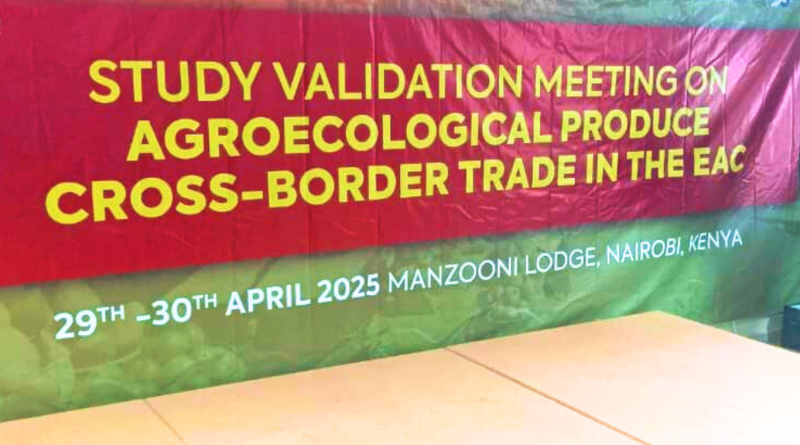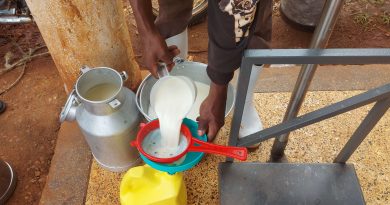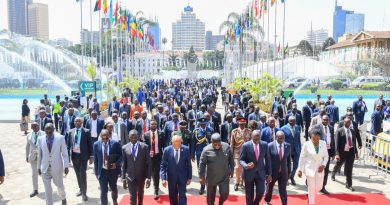Agroecology Trade Booms at East African Borders Despite Policy Blindspot
Machakos, Kenya — Agroecology products are increasingly flowing across East African borders, but they remain largely unrecognized in official trade statistics, a new report from the Alliance for Food Sovereignty in Africa (AFSA) reveals.

The report, shared during a study validation meeting in Machakos on April 29–30, examined trade at key crossing points between Kenya, Uganda, Tanzania, and Rwanda, highlighting the growing scale of cross-border trade in goods produced through agroecology—a farming approach rooted in ecological sustainability, social justice, and resilience.
Among the products are staple foods such as maize, rice, beans, and cassava, along with organic inputs like bio-fertilizers.
At the Busia crossing between Kenya and Uganda, traders moved nearly 147 metric tons of maize and 93 metric tons of beans in the past year—equivalent to about 1,600 and 1,000 sacks of 90 kg each.
Other trade hotspots showed similar trends.
At Mpondwe, on the Uganda–Democratic Republic of Congo border, rice dominated with more than 100,000 metric tons exchanged. Avocados led trade volumes at Namanga (Kenya–Tanzania), while cassava and beans topped volumes at Rusumo (Rwanda–Tanzania).
“We observed large volumes of agroecological products, including food staples and bio-fertilizers, being traded across borders,” said Dr. Chaka Uzondu, a food systems researcher and co-lead of the AFSA study.

Despite this significant activity, much of the trade remains informal and unrecorded—leaving agroecology trade absent from national and regional policy frameworks.
This disconnect between the vibrant ground-level trade and policy recognition was a key focus during the validation meeting.
Agriculture is not just about having food to eat—it’s about livelihoods,” said Ruth Nabaggala, Project Officer for the African Agroecological Entrepreneurship (AAE) initiative at AFSA. “This study shows where agroecology is already thriving as a business—and how we can support it.”

The validation event brought together policymakers, traders, farmers, and experts from the East African Community (EAC) and COMESA to discuss the study’s findings, including the challenges of non-tariff barriers, particularly the lack of policy harmonization, which has created obstacles for small-scale farmers seeking to navigate cross-border trade.
For traders, inconsistent border procedures remain the biggest challenge.
Mariam Babu, a veteran Ugandan trader and chairperson of the Busia Women Cross-Border Traders Cooperative, underscored the need for uniform rules.

“When the rules are the same, we save money, time, and avoid bribes,” she said. “But right now, we’re dealing with different fees, documents, and labeling requirements—it drives up costs and exposes us to risks we can’t afford.”
She added that the perishable nature of agroecology products, coupled with high volumes and delays in processing, often leads to spoilage and reduced profits.
Agnes Oningo, Director of Crops at the Department of Agriculture in Busia County, Kenya, called for improved regional coordination and investment in processing infrastructure.
“We grow the paddy, but Uganda processes it and we buy back the rice,” she said. “There’s a lot of interdependence. It works—but it could be far more beneficial with local processing support.”
She said that eggs, cassava, sorghum, and rice move frequently across the Kenya–Uganda border.
“Some farmers know they’re practicing agroecology, others don’t use the term—but their methods align with it, and their products are being traded,” she said.
The study—supported by the Swedish International Development Cooperation Agency (Sida)—points to agroecology’s untapped economic potential in East Africa.
While the sector has the capacity to boost rural incomes and strengthen food systems, fragmented policies and institutional disconnects hinder its growth.
Ayele Kebede Gebreyes, Senior Program Manager, Regional Development Cooperation Africa, said that overlapping memberships in regional bodies often cause duplication.

“Some countries are members of different institutions working on similar issues, which leads to overlap,” he said.
To address this, Sida partnered with AFSA to map agroecology trade flows and provide data to support regional policy alignment.
The study cites a lack of coordination between blocs such as the EAC and the African Continental Free Trade Area (AfCFTA), whose overlapping mandates create regulatory gaps that disadvantage small-scale producers.
These gaps tend to favor large, industrial producers who are better positioned to meet certification requirements, navigate customs systems, and comply with export standards.
Dr. Christopher Onyango, Director of Trade and Customs at COMESA, said tools such as the Simplified Trade Regime (STR) could bridge this gap if fully implemented.

“COMESA has the tools in place,” he said. “If properly implemented, the STR could boost grassroots-level trade across border areas.”
As calls for policy reform grow, regional cooperation is emerging as a key lever to scale agroecology.
Francoise Uwumukiza, chair of the Agriculture, Tourism, and Natural Resources Committee at the East African Legislative Assembly, said efforts are underway to support the sector.
“We are pushing for policy improvements to ensure that agroecology is properly supported in trade,” she said. “Harmonizing policies across borders is essential for agroecology to thrive as a driver of regional trade.”
A recurring theme in the study is the resilience of agroecological production systems, which continue to grow in harmony with nature despite systemic challenges.
The report recommends stronger verification systems, improved infrastructure, better policy harmonization, and greater support for farmer-led organizations to unlock the sector’s full potential.
Farmers and traders noted that agroecology supports local employment—particularly among women and youth—through informal networks built on trust.

“These are trust economies,” said Samy Jean Takimbula, a cross-border trader and vice-chair of South Kivu’s Provincial Civil Society Coordination Bureau in the Democratic Republic of Congo.
“Our markets move not because of bureaucracy, but because we know each other. Recognition—not regulation for its own sake—is what we need.” Takimbula said.
Bridget Mugambe, AFSA’s Cross-Border Trade Program Coordinator, said the study shows agroecology is already delivering results at border points and has real commercial promise.

“Agroecology trade is more than just a theoretical concept—it works,” Mugambe said. “This evidence counters the notion that agroecology is simply an outdated farming system.”
She said the findings will shape a two-year initiative to strengthen cross-border trade in agroecological products across Eastern Africa.
“Although policy gaps remain, we’re optimistic,” Mugambe said. “With collaboration and data-driven solutions, we can build a more resilient agricultural trade system.”
Armed with this data, AFSA will map essential storage and trade hubs and pursue further research on new border points—moving agroecology trade firmly onto the regional policy agenda.



